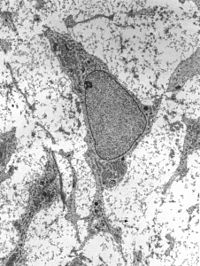
Photo from wikipedia
Skeletal muscle mass is critical for good quality of life. Mesenchymal stem cells (MSCs) are multipotent stem cells distributed across various tissues. They are characterized by the capacity to secrete… Click to show full abstract
Skeletal muscle mass is critical for good quality of life. Mesenchymal stem cells (MSCs) are multipotent stem cells distributed across various tissues. They are characterized by the capacity to secrete growth factors and differentiate into skeletal muscle cells. These capabilities suggest that MSCs might be beneficial for muscle growth. Nevertheless, little is known regarding the effects on muscle protein anabolic and catabolic systems of intramuscular injection of MSCs into skeletal muscle. Therefore, in the present study, we measured changes in mechanistic target of rapamycin complex 1 (mTORC1) signaling, the ubiquitin–proteasome system, and autophagy-lysosome system-related factors after a single intramuscular injection of MSCs with green fluorescence protein (GFP) into mouse muscles. The intramuscularly-injected MSCs were retained in the gastrocnemius muscle for 7 days after the injection, indicated by detection of GFP and expression of platelet-derived growth factor receptor-alpha. The injection of MSCs increased the expression of satellite cell-related genes, activated mTORC1 signaling and muscle protein synthesis, and increased protein ubiquitination and autophagosome formation (indicated by the expression of microtubule-associated protein 1 light chain 3-II). These results suggest that the intramuscular injection of MSCs activated muscle anabolic and catabolic systems and accelerated muscle protein turnover.
Journal Title: Scientific Reports
Year Published: 2021
Link to full text (if available)
Share on Social Media: Sign Up to like & get
recommendations!